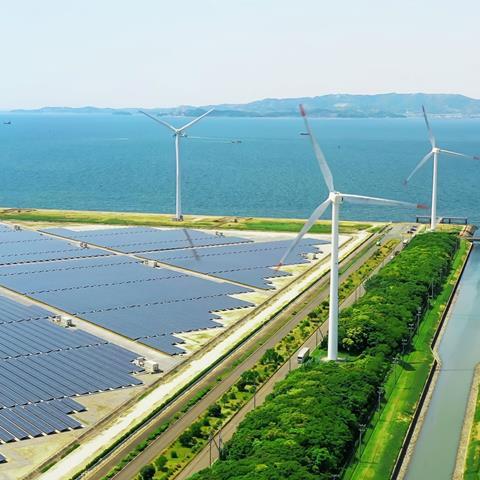By Gina Hanrahan, Senior Specialist, Climate Policy, PRI

Countries are gathering for the next round of UN climate negotiations at COP29 in Baku in November. As they prepare to rachet up their climate ambition, will the next round of Nationally Determined Contributions (NDCs) help to unlock more capital flows?
NDCs are national climate action plans and targets, ushered in under the 2015 Paris Agreement. All countries must deliver more ambitious plans every five years, and February 2025 is the deadline for the third round.
PRI signatories, regulators and other financial actors are expressing increasing interest in making the next round ‘investable’, in a bid to ensure that NDCs play a part in wider economic strategies.
Will NDCs send a clearer investment signal?
Investable NDCs have the potential to send important signals to global markets and facilitate greater flows of capital into the economic transition to net zero and climate resilience. This signal was weakened in previous years due to a gap between headline commitments and national strategies, and insufficient budgets to ensure policy delivery.
A major feature of the third round of NDCs will be the declaration of a 2035 emissions reduction target. But NDCs are not limited to national emissions goals alone. Countries may include sectoral targets, investment plans, and policies on both mitigation and building resilience to worsening climate impacts.
Investors have an opportunity to help shape these new NDCs as they evolve.
Making NDCs investable, and accelerating capital to the economic transition, is one of our best opportunities to limit climate change
What is an investable NDC?
For the next round of NDCs, many expert bodies and investor organisations have begun identifying features that could allow countries to send clearer signals for greater capital flows towards their decarbonisation and resilience efforts.
Research on investable NDCs has been published by organisations including the UNFCCC, the PRI, OECD and International Energy Agency’s Climate Change Expert Group, World Resources Institute, NDC Partnership, Centre for Climate and Energy Solutions, We Mean Business Coalition, Institutional Investors Group on Climate Change and Climate Bonds Initiative.
While there is not yet a commonly agreed definition of an investable NDC, and each of these organisations may emphasise different characteristics, common elements are emerging.
Important elements of NDCs may include:
- targets that are credible, scientifically informed, and consistent with countries’ commitments to the Paris Agreement and reaching net zero;
- stable regulatory frameworks to implement NDCs over the long term, where the entire government is engaged in planning and implementation;
- national implementation plans.
- granular sectoral decarbonisation strategies and pathways, including sectoral targets and policies.
- an NDC investment plan that quantifies capital needs and time horizons for capital deployment, current funding gaps, expected public-private split and potential instruments that may be used to attract investment; and
- social inclusion considerations, such as a just transition and gender parity, as well as skills development and workforce preparedness.
Countries vary in their preparedness and capacity to develop NDCs with these features. Therefore, some countries may choose to include a commitment to develop these additional elements over time or make them conditional on international assistance.
Benefits of investable NDCs
More robust NDC commitments bring several benefits, including providing a more credible investment signal to global markets.
For example, Aviva Investors has noted that transition plans associated with an investable NDC can help investors to identify investment opportunities and understand how governments are managing climate risk.
More broadly, investable NDCs would mean national commitments are increasingly focused on climate action and implementation, supporting governments to deliver their goals and engage with capital markets on financing.
By ensuring coherence between NDCs and other critical national strategic planning on issues like nature restoration and climate adaptation, nations can strengthen their investment signal and avoid market fragmentation.
The role of investors in supporting investable NDCs
Investors play an important role in supporting policy makers to identify and develop investable NDCs.
For example, last September, 534 financial institutions, representing US$29 trillion in assets under management, coordinated by the Investor Agenda, called on governments around the world to unlock public and private capital flows for the net-zero transition. This included a focus on NDCs and detailed whole of government policies to support them.
Through the PRI Collaborative Sovereign Engagement on Climate Change, investors have also engaged directly with the Australian Government about its next NDC. This engagement included identifying how investors use NDC-related information, and findings were submitted to the national Climate Change Authority, which provides formal advice to the Australian government on climate targets and plans. The initiative is due to expand to additional markets in 2025 and PRI signatories can sign up to a waiting list to join.
We are further supporting this NDC agenda through engagement at the UNFCCC negotiations, including COP29 in Baku. This work builds upon our ongoing detailed market-level policy analysis and engagement on a ‘whole of government’ approach to the economic transition.
A major part of an enabling policy environment
Current national policies on climate and energy do not yet put us on track to limit warming to the Paris Agreement’s temperature goals.
Making NDCs investable, and accelerating capital to the economic transition, is one of our best opportunities to limit climate change and the systemic risk it poses to investors and financial markets.
PRI will be on the ground at COP 29, which takes place from 11 to 22 November, to support policy engagement on NDCs and other key priorities. PRI will be participating in and hosting several events. Find more details of our programme, which will be updated as details are confirmed.
The PRI blog aims to contribute to the debate around topical responsible investment issues. It should not be construed as advice, nor relied upon. The blog is written by PRI staff members and occasionally guest contributors. Blog authors write in their individual capacity – posts do not necessarily represent a PRI view. The inclusion of examples or case studies does not constitute an endorsement by PRI Association or PRI signatories.












